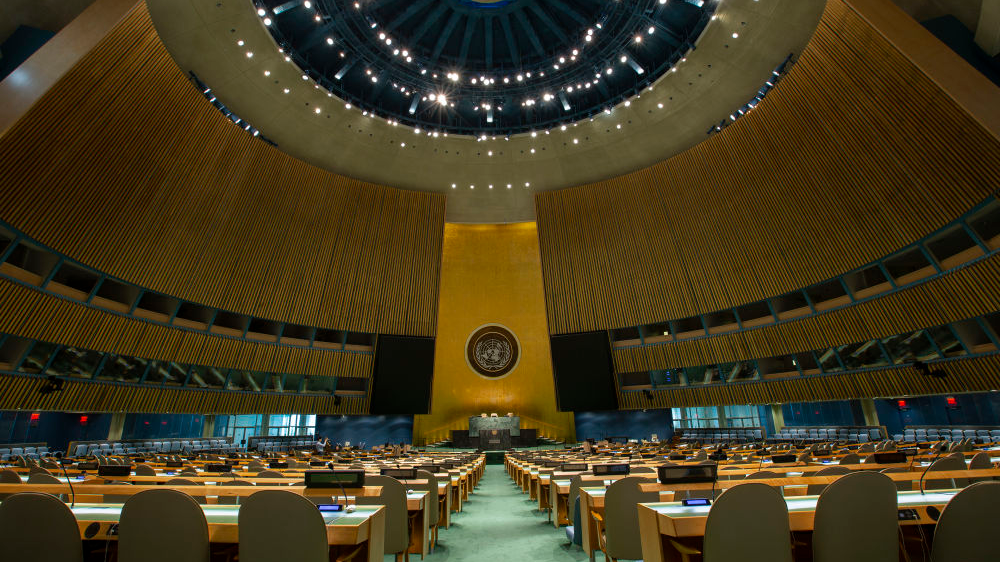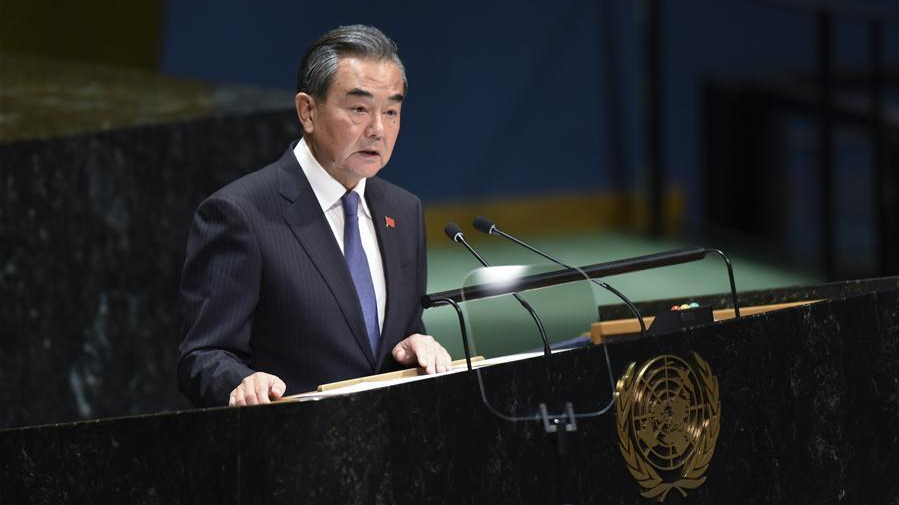
The UN General Assembly hall. /Xinhua
The UN General Assembly hall. /Xinhua
Editor's note: Yi Fan is a Beijing-based observer. The article reflects the author's opinions and not necessarily the views of CGTN.
The Chinese people have employed different kinds of farming techniques since ancient times, incorporating their wisdom and philosophy. The rice-fish system, meaning growing fish in the rice fields, is an example. The rice paddies offer protection and organic food for the fish. In return, the fish soften the soil, provide nutrients and oxygen for the rice and consume insects and weeds. It is just amazing that farmers began to use such a polyculture system as early as some 2,000 years ago, which could be seen as a nascent model of sustainable development.
In 2005, the rice-fish system was designated as the first group of Globally Important Agricultural Heritage Systems (GIAHS) of the Food and Agriculture Organization (FAO). Through the FAO-China South-South Cooperation Trust Fund, over 80 Chinese rice-fish experts have been fielded to other developing countries in Africa, Asia and the South Pacific to promote this sustainable agricultural model, which contributes to local food security, income generation and biological conservation.
That is only a very small part of the story. This year marks the 50th anniversary of the restoration of the lawful seat of the People's Republic of China at the United Nations (UN). Over the past decades, China has played an active and positive role in the UN, and a considerable share of China's effort is about, of and for fellow developing countries.
Shared principles
Sovereign equality is an important principle of the UN Charter. To elaborate, this principle is based on the notion that all nations are equal regardless of their size, strength and wealth. That said, developing countries have long been underrepresented in global governance. China, deeply devoted to the principle of sovereign equality, has all along stood with the rest of the developing community. As Chinese State Councilor and Foreign Minister Wang Yi aptly puts it: "China's vote at the UN is always for the well-being of developing countries and for justice in the world."
Having suffered from the foreign invasion in their respective national histories, developing countries deeply appreciate their hard-won independence. In 1971, in the first speech after the restoration of the lawful seat of the People's Republic of China, its delegation expressed its support for nations struggling for liberty and independence and confidence in their victory. Over the years, China has supported the just cause of pursuing national independence by fellow developing countries and stood by their side at the UN.
For the UN, the world's major multilateral institution, to keep up with the times, developing countries must be better seen and heard in its decision-making process. Gladly, some highly visible achievements have been made. Take climate action. China has been a firm advocate of the principle of "Common but Differentiated Responsibilities" (CBDR) in international environmental law. It is understood that all states are responsible for addressing global environmental destruction, yet not equally so, and that there is a real need to recognize the wide differences in the levels of economic development among states.
Common development
Development is one of the main priorities of the UN, and China has worked tirelessly for common development and prosperity under the UN framework. Over the years, China has kept exploring and improving means to help other nations develop.
China has synergized its development assistance with the Belt and Road Initiative (BRI) for amplifying results. UN Secretary-General António Guterres recognized that the five pillars of the BRI are linked to the 17 SDGs and can translate into "real-life progress for the people." The United Nations Development Program, United Nations Industrial Development Organization and several other UN agencies are involved in Belt and Road cooperation to help developing countries not only to develop, but to do so sustainably.
No political strings are attached to any help that China provides. When speaking at the UN General Assembly for the first time, the delegation of the People's Republic of China stated unequivocally that China's assistance for fellow developing countries comes with deep respect for their sovereignty. China never attaches political strings or seeks privileges by offering assistance.
And that has been a defining feature in China's development assistance. China understands deeply the imperative to address the pressing needs of the least developed countries. At the UN Summit on Sustainable Development in 2015, President Xi Jinping announced that China would continue to increase investment in the least developed countries, aiming to attain a level of $12 billion by 2030 and write off debts on the outstanding intergovernmental interest-free loans due by the end of 2015 from designated least developed countries, landlocked developing countries, and small island developing states.

Chinese State Councilor and Foreign Minister Wang Yi addresses the General Debate of the 74th session of the UN General Assembly at the UN headquarters in New York, U.S., September 27, 2019. /Xinhua
Chinese State Councilor and Foreign Minister Wang Yi addresses the General Debate of the 74th session of the UN General Assembly at the UN headquarters in New York, U.S., September 27, 2019. /Xinhua
Facing the severe shocks of COVID-19, with a view to jointly steering global development toward a new stage of balanced, coordinated and inclusive growth, President Xi proposed a Global Development Initiative at the recently held General Debate of the 76th session of the UN General Assembly. This important initiative emphasizes benefits for all, with a focus on caring about the special needs of developing countries and addressing unbalanced and inadequate development among and within countries. The initiative is another example of China's contribution to the global cause of development and speaks volumes about China's commitment to true multilateralism.
COVID-19 response
COVID-19 caught the world unguarded. Developing countries, given their vulnerable public health systems, have been hit particularly hard. To quote UN Secretary-General António Guterres: "The crisis is a major shock for developed economies, but for developing countries, it is an emergency."
The World Health Organization (WHO) has played an essential role in coordinating global efforts to fight COVID-19 and especially in helping developing countries to cope. While certain countries chose to halt funding to this critical organization, China made additional contributions to the WHO and delivered firm support to help fellow developing countries to beat the virus and more important, buttress their public health systems.
Just like an army marches on its stomach, logistics and medical supplies are critical in overcoming the COVID-19. In April 2020, a global humanitarian response hub by the World Food Program (WFP) was set up in China, as part of the greater UN effort to fight the pandemic. This hub helps coordinate the delivery of lifesaving medical and humanitarian supplies to developing countries at a time when commercial air transport is at a virtual standstill, as aircraft are arranged to move the cargo. The transport arrangements also apply to personnel. Professionals are able to reach severely affected countries, where their expertise is much needed.
Large-scale vaccination is vital to contain the spread of the virus. Yet, for various reasons, there is an immense North-South gap in the manufacturing and distribution of COVID-19 vaccines. COVAX, a mechanism co-led by the WHO and other institutions, has been set up with the purpose to accelerate the development and manufacturing of COVID-19 vaccines and ensure their fair and equitable distribution. While high-income countries promised to donate more than one billion vaccine doses to poorer countries, less than 15 percent of those doses have been materialized.
Chinese manufacturers, on their part, have signed supply agreements with COVAX for millions of doses. In addition, the Chinese government has pledged a $100 million donation to COVAX specifically for distributing vaccines to fellow developing countries. This will contribute greatly to addressing the distribution deficit and make COVID-19 vaccines truly a global public good. Meanwhile, China has donated vaccines to UN peacekeepers as well as staff in some other international organizations.
An enduring commitment
For all the things that China has done, they translate into reality China's commitment to common progress and prosperity. They also generate more opportunities for the UN and the developing world. True development is development for all. Under the UN framework, other developing countries can access more funding, technologies and projects supported by China. The other way around, when the united message of developing countries is better heard, international relations will be more democratic, the trend toward multipolarity more strongly underpinned, and the UN better positioned to keep abreast with the times.
Given China's large population, one could only imagine what a daunting task the country faces in meeting its domestic needs, be it funding, jobs, vaccines or anything else. Yet China is resolved to do everything in its power to help other developing countries. Some might speculate about the motive. Is it to gain greater leverage or to brand itself? Of course, China has a purpose in everything it does. What it does serves a much higher purpose.
The People's Republic of China was once kept out of the UN for as long as 22 years. In 1971, the UN General Assembly at its 26th session adopted resolution 2758, restoring all the lawful rights to the People's Republic of China. Long and hard as it was, the journey of China back to the UN had the support of other developing countries. Chairman Mao Zedong once said it was our fellow developing countries that "carried" the People's Republic of China into the UN. Over the past five decades, China has been acting in the same spirit by standing together and working together with fellow developing countries. And that is the larger purpose of China – meeting the common interests of the developing world.
Time will tell. Over the years, developing countries have always stood by each other's side, which in turn contributes to a more effective and democratic UN. Such a mutually reinforcing relationship bears a resemblance to the rice-fish system – stronger when together. This is not only good for developing countries. It is good for the whole world.
(If you want to contribute and have specific expertise, please contact us at opinions@cgtn.com.)

